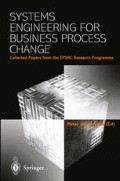Abstract
RIPPLE is one of a linked set of projects at the University of Ulster which are based on the premise that an organisation and its IT facilities should be aligned and evolve together towards a documented ‘vision’ for the system as a whole. This strategy is intended to ensure that software development is directly supportive of an organisation and remains aligned as business and computing changes occur. This paper describes 10 contributions made by RIPPLE to a framework for software development based on the co-evolutionary concept. The framework, BASE, is built around the modelling of co-evolutionary change, expressed in the form of a development plan. Soft Systems Methodology (SSM) is used to establish the vision for an organisation and much of the work has been concerned with building on the models that it produces. RIPPLE is a collaborative project with the Northern Ireland Civil Service and BT, with additional contributions from NEC.
Access this chapter
Tax calculation will be finalised at checkout
Purchases are for personal use only
Preview
Unable to display preview. Download preview PDF.
References
Beer, S. (1985). Diagnosing the System for Organisations. Wiley.
Boar, B.H. (1994). Practical Steps for Aligning Information Technology with Business Strategy. Wiley.
Boehm, B.W. (1988). A spiral model of software development and enhancement. IEEE Computer, 21 (5), 61–72.
Bustard, D.W. and He, Z. (1998). A framework for the revolutionary planning and evolutionary implementation of a business process and its computing support. Logistics Information Management, 11(6), 370–374.
Bustard, D.W. and He, Z. (1999). System co-evolution: a software engineering perspective. In Proceedings of SOHE ‘89, Workshop on Software and Organisation Co-Evolution, Oxford, September.
Bustard, D.W. and Lundy, P.J. (1995). Enhancing soft systems analysis with formal modelling. In Proceedings of the 2nd IEEE International Symposium on Requirements Engineering. IEE Press, pp. 164–171.
Bustard, D.W. and Lundy, P.J. (1999). A software engineering framework for methods integration (submitted for publication).
Bustard, D.W., Oakes, R. and Heslin, E. (1993). Support for the integrated use of conceptual and dataflow models in requirements specification. In Colloquium on Requirements for Software Intensive Systems, DRA Malvern, pp. 37–44.
Bustard, D.W., Dobbin, T.J. and Carey, B.N. (1996). Integrating soft systems and object-oriented analysis. In IEEE International Conference on Requirements Engineering, Colorado Springs, CO, pp. 52–59.
Bustard, D.W., Oakes, R. and Vincent, D.D. (1997). Business analysis for computing purposes: one analyst or two? In Stowell et al. (eds), Systems for Sustainability, Proceedings of UKSS’97. Plenum Press, pp. 549–554.
Bustard, D.W., He, Z. and Wilkie, F.G. (1999a). Soft systems and use-case modelling: mutually supportive or mutually exclusive? In Proceedings of the 32nd Hawaii International Conference on System Sciences (HICSS-32), Maui, Hawaii (CD-ROM). IEEE, 8 pp. (also revised and accepted for publication in Interacting with Computers).
Bustard, S.W., Oakes, R. and Vincent, D.D. (1999b). Retaining and maintaining soft system models. In Castell, A.M. et al. (eds), Synergy Matters, Working with Systems in the 21 st Century, Proceedings of UKSS ‘89. Plenum Press, pp. 409–414.
Bustard, D.W., Oakes, R. and He, Z. (1999c). Models to promote effective system change. In Proceedings of the International Conference on Software Maintenance, ICSM ‘89, Oxford, UK, 30 August-3 September.
Bustard, D.W., Greer, D., He, Z., Lundy, P., Oakes, R. and Wilkie, F.G. (2000a). The co-evolution of a business and its computing support. In Bustard, D.W., Kawalek, P. and Norris, M.T. (eds), Systems Modelling for Business Process Improvement, Artec House, in press.
Bustard, D.W., Kawalek, P. and Norris, M.T. (eds) (2000b). Systems Modelling for Business Process Improvement. Artec House, in press.
Castell A.M. et al. (eds) (1999). Synergy matters, working with systems in the 21st century. In Proceedings of UKSS ‘89. Plenum Press.
Checkland, P. (1981). Systems Thinking, Systems Practice. Wiley, New York.
Checkland, P. and Scholes, J. (1990). Soft Systems Methodology in Action. Wiley, New York.
Gilb, T. (1988). Principles of Software Engineering Management. Addison-Wesley.
Greer, D. and Bustard, D.W. (1997). SERUM: software engineering risk: understanding and management. Project and Business Risk Management, 1(4), 373–388.
Greer, D., Bustard, D.W. and Sunazuka, T. (1999). Prioritisation of System Changes Using Cost-Benefit and Risk Assessments, RE ‘89, Limerick, pp. 180–187.
He, Z. and Bustard, D.W. (1999a). Semantic Model Linkage in the BASE Framework.
He, Z. and Bustard, D.W. (1999b). A CASE Tool Design for Co-Evolution of a Business Process and its Supporting Software.
Loucopoulos, P. and Karakostas, V. (1995). System Requirements Engineering. McGraw-Hill.
Mingers, J. and Taylor, S. (1992). The use of soft systems methodology in practice. Journal of the Operational Research Society, 43(4), 321–332.
Rook, P. (1986). Controlling software projects. Software Engineering Journal, 1(1), 7–16.
Rumbaugh, J., Jacobson, I. and Booch, G. (1998). Unified Modeling Language Reference Manual. Addison-Wesley.
SOHE (1999). Proceedings of SOHE.’99, Workshop on Software and Organisation Co-Evolution, Oxford, September.
Sommerville, I. and Saywer, P. (1997). Requirements Engineering, A Good Practice Guide. Wiley.
Stowell, F.A. (ed.) (1995). Information Systems Provision: The Contributions of SSM. McGraw-Hill, London:
Turner, K.J. (ed.) (1993). Using Formal Description Techniques: An Introduction to ESTELLE, LOTOS and SDL. Wiley.
Wilson, B. (1990). Systems: Concepts, Methodologies, and Applications( 2nd edn ). Wiley, New York.
Editor information
Editors and Affiliations
Rights and permissions
Copyright information
© 2000 Springer-Verlag London
About this chapter
Cite this chapter
Bustard, D.W., Greer, D., He, Z., Lundy, P.J., Wilkie, F.G., Oakes, R. (2000). RIPPLE: Retaining Integrity in Process Products over their Long-term Evolution. In: Henderson, P. (eds) Systems Engineering for Business Process Change. Springer, London. https://doi.org/10.1007/978-1-4471-0457-5_5
Download citation
DOI: https://doi.org/10.1007/978-1-4471-0457-5_5
Publisher Name: Springer, London
Print ISBN: 978-1-4471-1146-7
Online ISBN: 978-1-4471-0457-5
eBook Packages: Springer Book Archive

